Young people involved in Viet Nam's fight against Covid-19
Young Vietnamese at home and abroad are striving to contribute to the country’s fight against Covid-19 in their own way, believing that everyone has a role to play for the sake of their homeland.
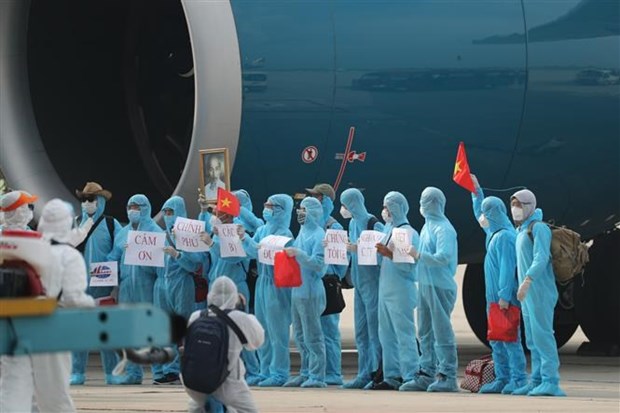 |
| Vietnamese citizens from Equatorial Guinea express their sincere thanks to the Party and State for bringing them home (Photo: VNA) |
Once-in-a-lifetime journey
Pilot Vu Duc Nghia proudly recalled that he was among the first to register for the historic flight bringing 219 Vietnamese citizens living in Equatorial Guinea home last week.
It was the 41st flight conducted by national flag carrier Viet Nam Airlines to bring citizens home from different parts of the world. It was the first time, however, that the airline had to do so while also dealing with a large number of infections, as many passengers were thought to be carrying the coronavirus SARS-CoV-2.
For 26-year-old Nghia, the flight offered him a new and challenging experience, he said in a video call interview.
No pilots from Viet Nam had ever flown to Equatorial Guinea’s Bata International Airport, he said, so many meetings were held to identify suitable air routes and operating procedures. Most of the crew members on the flight had a lot of experience, and Nghia was one of the five pilots.
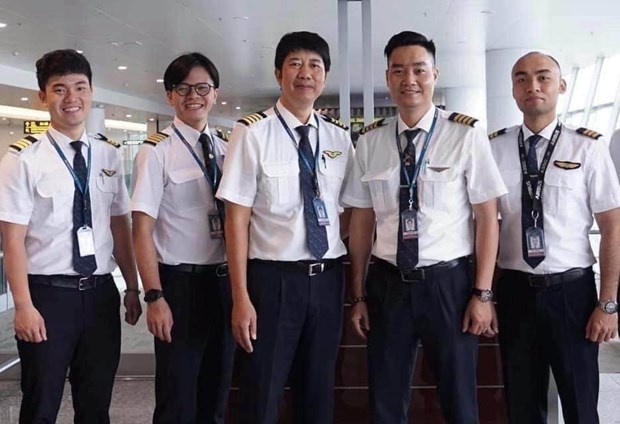 |
| Vu Duc Nghia (first from left) and other pilots of the recent flight bringing 219 Vietnamese citizens living in Equatorial Guinea home (Photo courtesy of the pilot) |
He overcame a brief period of anxiety prior to the trip, with his family standing behind him all the way.
Flying compatriots home
“I was truly proud of being able to overcome the anxiety and felt like a victorious soldier coming home,” he said.
The most memorable and touching moment for him came when the aircraft just landed at the Bata International Airport.
“One of the pilots held a national flag up against the cockpit window for the Vietnamese people at the airport to see,” he said. “They responded in an instant by holding up national flags and portraits of President Ho Chi Minh.”
The gold star on a red background remains a symbol of hope and trust for all Vietnamese people.
“It was indeed a long, exhausting flight, and I had to wear tight protective clothing for the whole trip,” he added.
The flight to Equatorial Guinea was his first direct flight to Africa. The guidance system used at the Bata International Airport was one not widely used elsewhere, so it was a valuable opportunity for him to broaden his aviation knowledge.
Though it was his first repatriation flight, the young pilot was also involved in quite an unusual flight nearly two years ago.
It was an additional trip conducted by Viet Nam Airlines to take football fans to Malaysia to watch the national men’s football team take on the hosts at the AFF Suzuki Cup, with the return flight taking off shortly after the final whistle. The round trip took seven hours in total, with a long wait in between.
Both flights, he said, were physically draining but at the same time quite memorable.
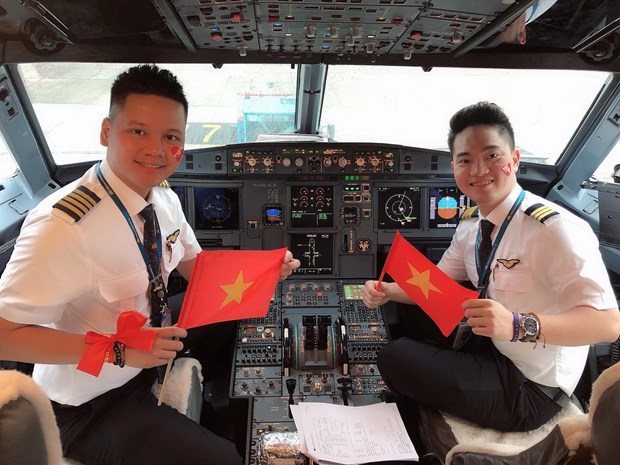 |
| Nghia (R) flew an additional trip conducted by Viet Nam Airlines to take football fans to Malaysia to watch a match at the AFF Suzuki Cup in 2018 (Photo courtesy of the pilot) |
Working together on common goals
As a pilot, the desire to explore new airports and lands, despite the challenges, provides Nghia with ample motivation.
He is still in a quarantine area at the National Hospital of Tropical Diseases in Hanoi with other members of the crew. The sound of people talking to each other could be heard in the background during our interview.
When his period of quarantine comes to an end, Nghia is more than ready for similar trips. He and his colleagues are already planning their next flights, he said with a broad smile.
“If I wasn’t able to go, my friends would,” he said. “We will work together to complete the task.”
“I don’t think anyone should just wait for their turn. Rather, everyone should be working together to reach the common goal.”
Staying calm in the middle of the “storm”
It’s been almost unimaginable how quickly the situation escalated in the central city of Da Nang at the end of July, even for Trinh Quang Chinh, 28, who was born and brought up in the city.
Locally-transmitted cases have been reported there since July 25. As of August 4 morning, the total number of coronavirus cases linked to the outbreak in the city had increased to 205.
Da Nang introduced social distancing measures from 00:00 on July 28 in all six districts as well as lockdown measures at the Da Nang C Hospital, the Da Nang Orthopaedics and Rehabilitation Hospital, and the Da Nang Hospital, as part of the city’s efforts to contain the spread of Covid-19.
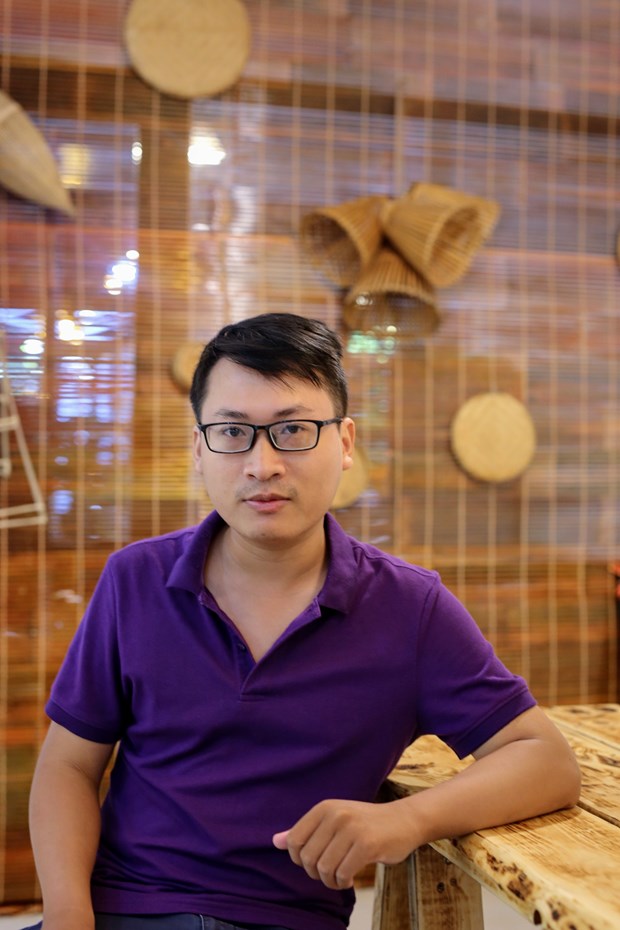 |
| Trinh Quang Chinh, 28, who was born and brought up in the central city of Da Nang (Photo courtesy of Chinh) |
In a telephone interview, Chinh, who works at a major university in Da Nang, said he feels more anxious than he did in April. He can’t help but be concerned that anyone could be carrying the virus, even relatives he met at recent events.
“It feels like we’re hibernating, and it takes time to get going after waking up. Since every sector, particularly the economy, tourism, and education, are affected, hardship lies ahead for a lot of people.”
He expressed his hope that community transmissions can be stopped and the life can return to normal, and wondered, like many, whether the restrictions will be extended beyond the current 15-day period.
Streets and beaches in Da Nang are now deserted, in direct opposition to their usual liveliness as one of the most famous and popular tourist spots in Viet Nam, he added.
“I can clearly sense we are engaged in a serious battle,” he said.
“I’m also swamped with and am sometimes confused by rumours and fake news. I have to triple-check everything I hear or read.”
Adapting to the situation
Chinh has gradually learned to adapt to the new circumstances, when the daily life is affected and close contact with others restricted.
“I am working online and keeping in touch with everyone,” he said. “My friends and I are checking up on each other more often these days.”
At this time of hardship, people can still feel each other’s warmth even though they can’t be close physically.
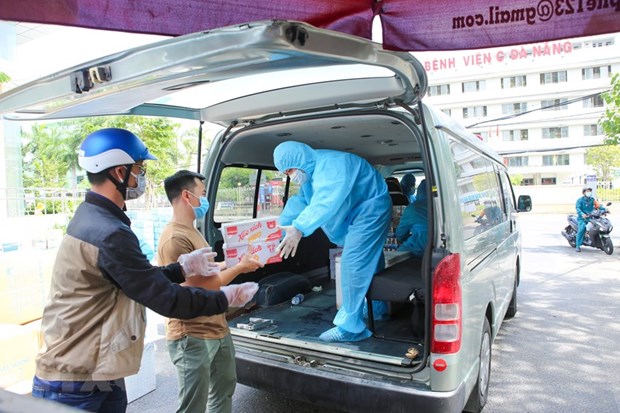 |
| People in Da Nang present aid packages to support those on the frontlines (Photo: VNA) |
It’s reassuring that the Government and Da Nang authorities have shown great determination to wipe out Covid-19 hotspots. The city is sparing no effort in battling the spread of the pandemic and enhancing contact tracing efforts, he said.
Meanwhile, local people are indeed observing social distancing measures and offering support to those on the frontlines, including health workers and those guarding places under lockdown, who carry on their duty despite rain and scorching sun.
“Everyone has a role to play in the fight,” Chinh said.
With a concerted effort, he believed the number of infections in the community will soon be reduced and the situation in his beloved hometown will be brought under control.
Longing to be home
After finishing her master’s programme in Australia, Nguyen Huyen Anh landed herself a position at a four-star hotel in Sydney, where she worked as a duty manager until just a few months ago.
The 26-year-old girl had already planned her return to Viet Nam before her post-graduate visa expired in August, but everything was turned upside down by the cessation of international flights.
As she has now been stood down from her job, Anh, who is considered a full-time employee, nonetheless receives no salary, she said during a video call interview.
Apart from bonuses on public holidays, of which there are few in Australia from May to August, she has neither received sick leave, personal leave, nor assistance from the local government, as any help is solely for Australian nationals.
And she must still pay the rent and living costs, since only utility bills have been waived.
She has signed up for a repatriation flight but understands that the wait will be long. The number of registrations, on the website of the Vietnamese Embassy, now exceeds 2,000. One flight can only carry 300 passengers, as the embassy noted.
“Three flights from Australia have been arranged,” she said. “Meanwhile, the day my visa expires is drawing closer and my anxiety is growing.”
She has tried to contact the embassy many times, but when she finally gets through she’s merely told to keep waiting and apply for a “Covid-19 Pandemic Visa”.
This allows holders to remain in the country if they have no other visa options and are unable to depart due to Covid-19 travel restrictions. Applicants must demonstrate why they can’t meet the requirements for another visa, according to the Australian Department of Home Affairs.
The department does not state a processing time, however, Anh added.
“It’s unsettling to think that I’m a Vietnamese national holding a Vietnamese passport but can’t return to my own country no matter how much I wish to,” she lamented.
She is, though, slightly relieved that she is able to get by without being a burden on her family in Viet Nam, as given she has been a legal taxpayer she can access her Australian superannuation tax-free.
Stay safe and be patient
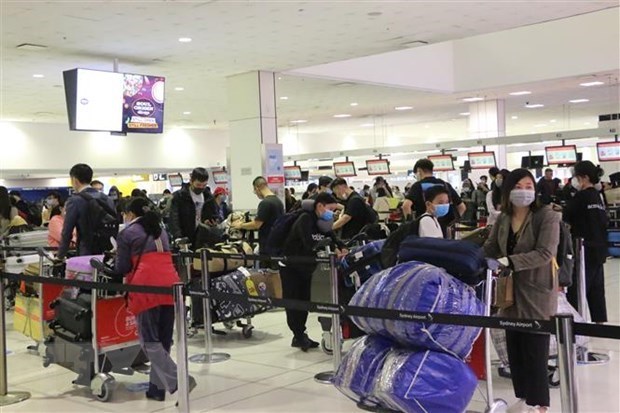 |
| Vietnamese citizens conduct procedures to fly home at Sydney airport (Photo: VNA) |
With new community transmissions confirmed in Da Nang and elsewhere, Anh fears it will be harder for more repatriation flights to be arranged.
“I stay in touch with my family regularly, as they are my mental support when I’m haunted by negative thoughts and pressure,” she added.
As hospitality is one of the hardest-hit sectors by Covid-19, she is aware that her chances of finding a suitable job once returning home will be slim.
“Even so, I want to come home as soon as possible, and I’m sure Viet Nam will promptly put the pandemic under control,” she said. “I hope there will be commercial flights open to Vietnamese soon.”
“I think to myself that my duty now is to stay safe and wait for when I am able to go home, so that I will not be a burden on my homeland or my family.”
Source: VNA